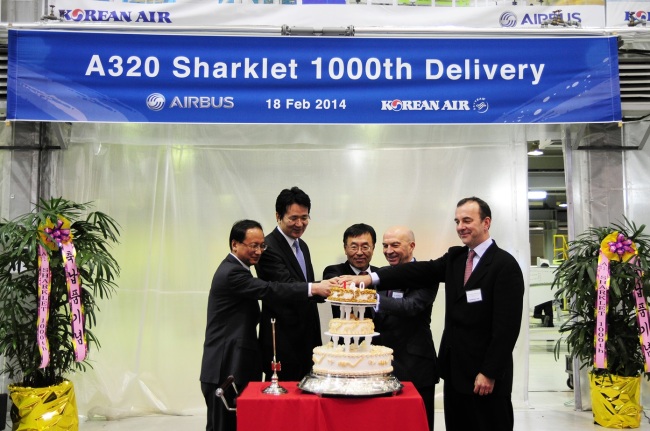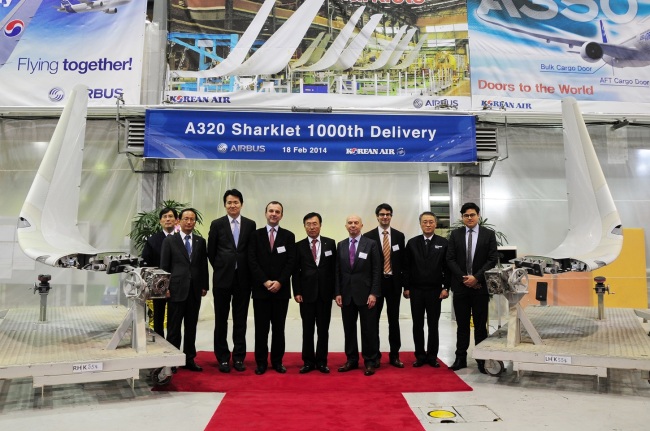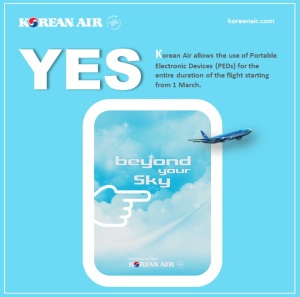Seoul, Korea (18 February, 2014) – Korean Air has affirmed its reputation as a world-class aircraft parts manufacturing company with an event to celebrate the delivery of the 1,000th ‘Sharklet’ to Airbus. A ‘Sharklet’, designed and accredited solely by Korean Air, is a ‘L’ shaped structure attached at the end of the wings of the A320 family of aircraft, it cuts down on aerodynamic drag, helping to reduce the spiral-shaped vortices that form at the wingtips of aircraft during flights.
Korean Air celebrated the production of the 1000th A320 ‘Sharklet’ at a ceremony attended by Mr. Walter Cho, Executive Vice President and Chief Marketing Officer, Korean Air; Mr. Young Sik Kang, Executive Vice President and Chief Technology Officer, Korean Air; Mr. Myung Rae Ham, Senior Vice President of Aerospace Division, Korean Air; Mr. Tom Williams, the executive vice president programmes, Airbus and Jean–Francois Laval, Executive Vice President of Sales, Airbus Asia.
 (the second from the left) Mr. Walter Cho, Executive Vice President and Chief Marketing Officer, Korean Air; Mr. Young Sik Kang, Executive Vice President and Chief Technology Officer, Korean Air; Mr. Tom Williams, the executive vice president programmes, Airbus; Jean–Francois Laval, Executive Vice President of Sales, Airbus Asia.
(the second from the left) Mr. Walter Cho, Executive Vice President and Chief Marketing Officer, Korean Air; Mr. Young Sik Kang, Executive Vice President and Chief Technology Officer, Korean Air; Mr. Tom Williams, the executive vice president programmes, Airbus; Jean–Francois Laval, Executive Vice President of Sales, Airbus Asia.
Korean Air has demonstrated its outstanding manufacturing ability to the world by producing 1,000 units in 22 months, since production started in April 2012. Korean Air plans to manufacture Sharklets to achieve a 400 million-dollar sales target by 2017.

(the third from the left) Mr. Walter Cho, Executive Vice President and Chief Marketing Officer, Korean Air; Jean–Francois Laval, Executive Vice President of Sales, Airbus Asia; Mr. Young Sik Kang, Executive Vice President and Chief Technology Officer, Korean Air; Mr. Tom Williams, the executive vice president programmes, Airbus
■ Korean Air’s independent technique from design to certification
The Airbus A320 family is the world’s best-selling, single-aisle aircraft with four models; A318, A319, A320 and A321. A total of 5850 A320 family aircraft have been delivered to 243 airlines in 101 countries.
In an effort to reduce CO2 emissions and help prevent global warming, Airbus planned to develop ‘Sharklet’ wingtip devices for its A320 family, which would also reduce fuel consumption.
In November 2009 Airbus announced that there would be an international bidding process for the A320 performance enhancement project and Korean Air participated, competing with over 20 companies from around the world. Korean Air was selected by Airbus as the sole supplier of the new Airbus-designed ‘Sharklet’ wingtip devices for the A320 Family in May 2010.
Korean Air independently carried out the design, development, manufacturing, testing and certification of the ‘Sharklet’ part, a project requiring highly sophisticated technological skills.
Built using lightweight composite materials, the 2.4-metre-tall ‘Sharklet’ is light and durable. ‘Sharklets’ help reduce the spiral-shaped vortices formed at the aircrafts wingtips during flight allowing aircraft to cut fuel burn by at least 3.5 percent, as well as improve payload-range performance and reduce carbon dioxide emission, which corresponds to an annual CO2 reduction of around 3,600 tonnes per aircraft.
■ ‘Auto Moving Line’ enables the production of more than 100 ‘Sharklets’ per month
Korean Air has established an ‘Auto Moving Line’ for the A320 ‘Sharklet’ production. ‘Auto Moving Line’ is rare in aerostructure manufacture, where small production systems are more common.
The ‘Auto Moving Line’ was established at a 1280㎡Tech Center Commercial Aircraft Manufacturing Plant in April 2013. The facility is equipped with a thermo-hygrostat for perfect production.
Since April 2012, when the first ‘Sharklet’ was delivered, Korean Air has produced an average of 4 ‘Sharklets’ per day and 80 ‘Sharklets’ per month.
■ Korean Air, an important manufacturer of aircraft components
Korean Air has played an important role as a major components manufacturer for both Airbus and Boeing, the world’s most famous aircraft manufacturers.
Developing the Sharklet for Airbus A320 neo, Korean Air produces 1st ‘neo Sharklet’ for test-flights. In addition, since 2012 Korean Air has manufactured the A350 cargo door, a product that is solely designed and developed by Korean Air. Recognized with its outstanding aerostructure manufacturing techniques, Korean Air was selected by Boeing as a supplier of B737 MAX winglet.
Meanwhile, Korean Air utilises its own technology in manufacturing helicopters and unmanned air vehicles, producing F-5 E/F, UH60 and 500MD since 1976. The airline expanded its business in 1986 to include the manufacturing business with civil aircraft components and has been providing key components, such as belly or wings, with cutting-edge technical skill, to the world’s top aircraft manufacturers.
About Korean Air
Korean Air, established in 1969, is one of the world’s top 20 airlines and carried more than 24 million passengers in 2012. Korean Air operates in excess of 200 flights per day to 125 cities in 45 countries on six continents with a fleet of 155 aircraft including eight A380s.
With its modern aircraft and over 20,000 professional employees, Korean Air offers customers safety, convenience and comfort. Korean Air’s award-winning offerings of Korean and Western meals and state-of-the-art inflight entertainment system provide passengers with a memorable inflight experience.
The airline serves six continents with more than 1,400 flights a week and is also a founding member of the Sky Team airline alliance which together with its 19 members, offers its 569 million annual passengers a worldwide system of more than 15,000 daily flights covering 993 destinations in 178 countries.
Korean Air introduced the double-decker A380 aircraft to its fleet in 2011 and made the interior more spacious than any other airline, with just 407 seats spread across three classes, with the top deck dedicated to ‘Prestige’ business class. The design also features the world’s first onboard ‘Duty Free Showcase’ and three bars and lounges.
More on Korean Air’s programs, routes, frequencies and partners is available at www.koreanair.com.


